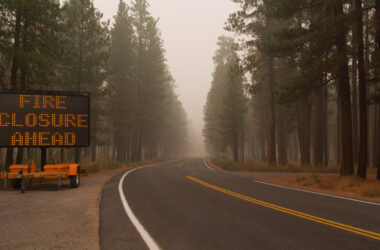A compromise over managing the Owyhee Canyonlands worked out by ranchers, environmentalists, hunters and others has drawn a powerful opponent – U.S. Rep. Cliff Bentz.
The Republican congressman from Ontario said in an interview Monday that he doesn’t support legislation that advances a deal worked out over years. He said he’s drafting his own plan.
The Malheur County Empowerment for the Owyhee Act, introduced in June, was the latest effort to resolve long-standing differences over how to manage vast federal rangelands in Malheur County. U.S. Sens. Ron Wyden and Jeff Merkley, Oregon Democrats, introduced the act – Senate Bill 1890 – to capture years of negotiations brokered by Wyden and his staff.
The deal would put about 1 million acres into wilderness but with provisions to preserve cattle grazing, require range improvements, expand protections for the Owyhee River and establish a federally-created local council to oversee the work.
Organizations from the Oregon Natural Desert Association to the Owyhee Basin Stewardship Coalition back the Senate proposal.
The desert association and other environmental groups recently revived the idea of putting the land into a national monument. They say their latest proposal is a different path to the same goal but aims for presidential action if Congress doesn’t approve the Owyhee Act. They say the monument proposal incorporates elements, including the same land area, now in the federal legislation.
“I’m putting together a bill that I think reflects what is possible in the Republican-controlled House.”
–U.S. Rep. Cliff Bentz
That proposal drew sharp rebuke from Bentz last week in a nearly four-minute speech on the floor of the U.S. House. He used the time to attack the monument idea and win House approval to prohibit the Biden administration from spending any money on creating such a monument. The restriction wouldn’t take effect unless passed by the U.S. Senate and signed into law by President Biden.
Bentz cited a failed 2015 proposal to put 2.5 million acres of the Owyhee into a national monument. He said nonprofits now are lobbying to “designate the same 2.5 million acres as a national monument, ignoring the years of work and time invested by those who live on and around this land.”
In an interview, Bentz said he relied on information from 2015 and had not talked to organizations newly promoting the monument.
Organizers said their latest proposal would cover only the 1.1 million acres already included in the compromise legislation.
“The 2015 discussions are no longer relevant,” said Ryan Houston, executive director of the desert association and a leader in the latest pursuit of a monument.
Bentz said in his speech that years of work resulted in the latest Owyhee legislation “addressing many of the concerns of interested parties.” He said the Senate bill “plus federal protections already in place” would “protect this important area.”
“There’s no reason for a national monument designation,” Bentz said.
That suggested support for the federal legislation, according to Houston.
“We were pleased to see Rep. Bentz share supportive remarks about the legislation last week on the floor of the House,” he said.
But in an interview, Bentz clarified he doesn’t support the Wyden legislation. He said he has a list of “25 problems with this bill.”
Bentz said he hasn’t shared his concerns with Wyden and didn’t bring up his opposition when the two met for breakfast two months ago. He also didn’t warn Wyden that he was taking to the floor last week to block federal spending on an Owyhee monument.
A monument designation has been a hot button topic in Malheur County. Voters in 2016 overwhelmingly supported a measure that opposed a national monument.
Following that defeat, Wyden hosted talks among groups that represent varied interests, from river rafting to cattle ranching.
One key group has been the Owyhee Basin Stewardship Coalition, which describes itself as “the voice of those who live, work and recreate in Malheur County. They are families, business owners, outdoor enthusiasts, ranchers and public servants.”
The coalition joined 10 other groups in delivering a letter to Wyden and Merkley in June supporting the Malheur act.
“The Malheur CEO Act seeks to address threats to the public lands in Malheur County including providing wildfire suppression through the reduction of invasive species and fine fuels,” the letter said. “It also provides for economic development and conservation that gives voice to local concerns. As you know well, these efforts are never easy, but they are important.”
Steve Russell, stewardship coalition chairman, said in an interview Tuesday the coalition remains behind the compromise legislation.
“There are good parts and bad parts,” he said, noting it preserves grazing on federal land that’s “real important.”
Russell also said that “one of the huge parts of this bill is land health.”

Another coalition leader, rancher Mark MacKenzie, described the interests of the coalition in a statement when the legislation was introduced.
“When it comes to protecting the Owyhee Canyonlands you won’t find a better group of people more committed to ensuring the beauty of the high desert remains intact. Our families wouldn’t be living here if we didn’t love the land. If you love something, you take care of it so it will last a long time,” he said.
In an interview on Monday, MacKenzie said a “massive effort” went into the Owyhee legislation involving “a lot of very productive conversations.”
Bentz said he wasn’t involved in the process leading to the legislation other than occasional talks with some of those participating.
He cautioned not to assume ranchers support the Owyhee Act, but wouldn’t elaborate.
“You need to talk to them,” he said in an interview.
Bentz said one concern is boosting tourism in the Owyhee Canyonlands. In his House speech, he said creating a monument would attract thousands, “resulting in the destruction of the very things a monument purports to protect.”
In his interview, Bentz said that concern was rooted in part by his visit to Yellowstone National Park, which draws more than 3 million people a year. He also said that special federal protection for Steens Mountain south of Burns resulted in “hordes” of tourists to the mountain and adjacent Alvord Desert
“It’s amazing how much damage people are doing to that environment,” Bentz said.
Officials in Harney County say tourism has increased, managed in remote areas with more garbage bins and increased presence of federal employees.
“We have seen an increase in tourism on the Steens Mountain and the Alvord, but I have not heard of damage,” said Deanna Thrall, executive director of the Harney County Chamber of Commerce. “I have been to both locations not long ago and I did not see any damage in these areas myself.”
Tourism and chamber officials this week hosted a series of meetings in Malheur County to consider increasing tourism, including at the Owyhee Canyonlands. Such tourism is seen as an economic benefit for the community.
“It’s not the type of land that’s set up for vast numbers of people,” Bentz said. “I oppose the type of tourism that would damage the land.”
Houston said tourism already is increasing in the canyonlands.
“The Owyhee is no longer a secret, visited and enjoyed by only the few who know about the area through personal experience or word of mouth,” Houston said.
He said the Owyhee legislation would require BLM plans to manage visitors.
“We anticipate that visitor and recreation management will improve compared to today,” Houston said.
Bentz said that if canyonlands tourism is pushed, organizers “better have the money” for trash, road maintenance and toilets.
Bentz’s amendment banning monument funding became part of a House budget bill that passed largely along party lines. The bill, supported by Bentz, would cut funding for the U.S. Bureau of Land Management by more than 20 percent.
For the Owyhee, Bentz said he expects to have his own legislative proposal ready in the coming weeks.
“A lot” of what’s in the Senate legislation “won’t be in my bill.”
Bentz said he’s navigating House politics.
“I’m putting together a bill that I think reflects what is possible in the Republican-controlled House,” Bentz said.
Houston said it is congressional politics that prompted a coalition of environment groups to launch what he said was a “parallel” campaign to incorporate the Owyhee compromise into a national monument designation.
“We are aware that it’s extremely difficult to pass public lands legislation through Congress these days,” he said. “We’re advocating that the national monument” that mirrors the Senate legislation and is “reflective of the needs of all stakeholders.”
Contact Les Zaitz: [email protected].
STORY TIP OR IDEA? Send an email to Salem Reporter’s news team: [email protected].
SUPPORT OUR WORK – We depend on subscribers for resources to report on Salem with care and depth, fairness and accuracy. Subscribe today to get our daily newsletters and more. Click I want to subscribe!

Les Zaitz is editor of Salem Reporter and also serves as editor and publisher of the Malheur Enterprise in Vale, Oregon.










